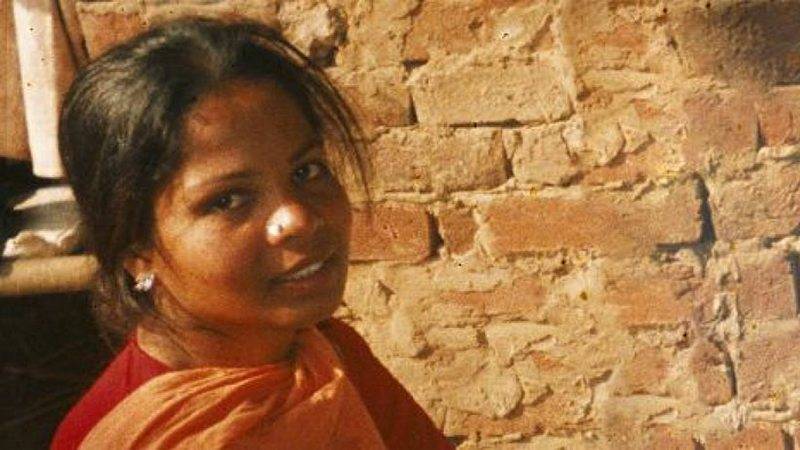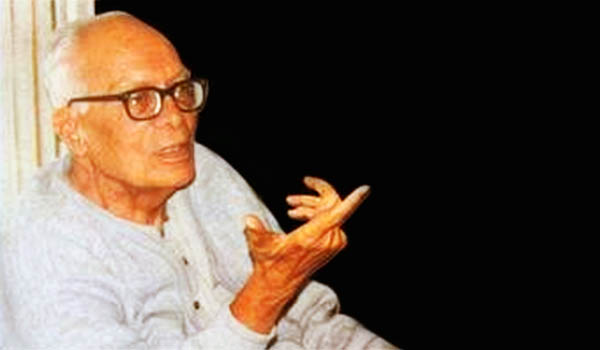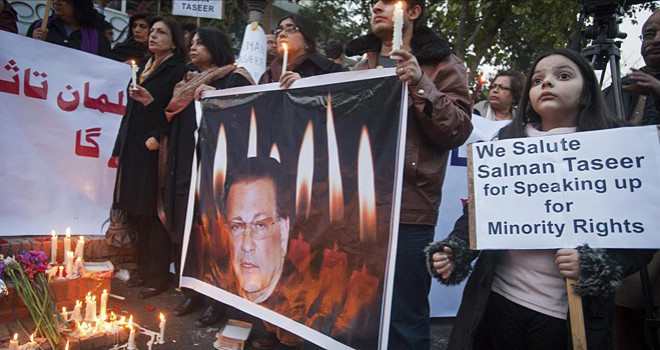
Asia Bibi, 47 years old and mother of five, remained in prison for a crime which she never committed, never even contemplated committing, but she fell prey to religious extremists who always misuse religion against the poor Christian community in the Central Punjab.
I am witness to the agonies of this Christian community living in small villages all over Central Punjab, mainly Lahore, Shaikupura, Gujranwala, Sialkot, and Faisalabad districts, where they are heavily dependent on local landlords, or big and middle level farmers for their livelihood. They work in the farms for harvesting and picking of farm outputs, apart from house cleaning and serving as maids for children of the affluent classes of the villages.
They live in small houses which are always without proper sanitation and ventilation. The land/space is given by the local landlord just for his own benefits. They are termed to be so polite and humble as they cannot afford harsh discussion on religion with Muslims who are in majority everywhere in Pakistan and now too extremist in religious thoughts due to the long Zia regime which lasted for over eleven years and promoted extremist religious views.
Also watch
https://www.youtube.com/watch?v=7EASbHhrY8o
I completely reject the notion that a person of a poor class like Asia Bibi, who was living alone with her husband and children in a village dominated by extremist Muslims in a district of Central Punjab, the Shaikhupura, could even think of indulging herself into a religious argument against Prophet Muhammad (Peace be upon him), or pass a single negative remark against Him (SAW) in front of any Muslim or a group of Muslims.
Pakistan is one among those seventy-one countries where blasphemy laws are still in place. Pakistan is among the only three countries in the Islamic world which have the strictest blasphemy laws, as here the alleged victim of blasphemy can be given death penalty, or life imprisonment.
Pakistan’s Penal Code Section dates back to pre-partition India, being introduced in 1860. Section 295, better known as the Blasphemy Law, deals with religious offences and was meant to prevent religious violence. Prior to 1986, only 14 cases pertaining to blasphemy were reported. However, after its inclusion in the Constitution of Pakistan and especially its propagation by the dictatorial regime of Zia ul-Haq, which led to a surge in radicalism in Pakistan, over 1300 cases have been registered under this article.
Nearly 700 Muslims have fallen victim to the blasphemy laws. Nearly 600 Ahmadis were declared blasphemers, and nearly 200 Christians and dozens of Hindus have been targeted using the blasphemy law. These blasphemy cases were hardly ever proven as they were concocted and fabricated in nature most of the times just to malign the opposition or to settle the scores.
Also watch
https://www.youtube.com/watch?v=IX4vcXYIUeA
Akhter Hameed Khan, a noted philanthropist, social activist, and accredited with Orangi Pilot Project was arrested on blasphemy allegations in 1992 when he was being interviewed by an Indian journalist at his home. At the time of his arrest, Mr Khan was 80 and recipient of many prestigious international awards for his work on Comilla Rural Development Project that aimed at rural development and microfinancing in Former East Pakistan, now Bangladesh. Later, when he moved to Karachi, he worked on Orangi Pilot Project, again a model for urban regularisation of slums in the urban centres.

He was first alleged of blasphemy by an employee of Orangi Pilot Project who had been fired and stated that Mr Khan had made blasphemous remarks during the interview.
The second time he was arrested on the allegations of writing blasphemous comments in a story for children. Religious scholar, Molana Ehtram ul-Haq Thanvi contended that the story was insulting Ali, the son-in-law of the Holy Prophet. The story, titled ‘Sher aur Ahmeq’, talks about a child who raised a lion. After Khan was charged, he clarified in an interview that the story was based on General Zia ul-Haq and Zulfiqar Ali Bhutto. Both the cases were withdrawn in 1992.
Even a bangle-stall owner, Chand Barkat, 28, was not sparedas another bangle vendor, Arif Hussain, accused him of blasphemy because of professional jealousy in Karachi, 1991.

Latest in the line was the brutal murder of Mashal Khan, a young student of Abdul Wali Khan University, who was allegedly blamed of posting blasphemous content online and was brutally lynched inside the campus by a mob of university students. All allegations against Mashal Khan were proven fake, concocted, fabricated, and framed in order to malign him intentionally as he had criticized mismanagement of the university administration in the past.
When we talk of blasphemy and blasphemous allegations on victims, the name of Salmaan Taseer cannot be ignored who was murdered by his own police guard Mumtaz Qadri because he as governor Punjab, had not only gone to meet Asia Bibi but had also sympathised with her later in his interviews and asked for the amendment in the law introduced by a dictator.

His brave remarks were disliked by radical forces in Pakistan and he was eliminated near a busy Kohsar Market café when he was coming out after having coffee.
The verdicts by the lower courts and the Lahore High Court on Asia Bibi case were full of contradictions and the decision authored by the Chief justice of Pakistan Saqib Nisar set aside the previous judgments by the trial courts and Lahore High Court for lack of credible evidence and directed to set Asia Bibi free from jail and ended the order with the following Hadith of our beloved Prophet: (صلى الله عليه وسلم) Muhammad “Beware! Whoever is cruel and hard on a non-Muslim minority, or curtails their rights, or burdens them with more than they can bear, or takes anything from them against their free will, I (Prophet Muhammad) will complain against the person on the Day of Judgment” (Abu Dawud).
This case may become the last nail in the coffin of the brutal man-made law which needs to be amended urgently by the Parliament of Pakistan.
I am witness to the agonies of this Christian community living in small villages all over Central Punjab, mainly Lahore, Shaikupura, Gujranwala, Sialkot, and Faisalabad districts, where they are heavily dependent on local landlords, or big and middle level farmers for their livelihood. They work in the farms for harvesting and picking of farm outputs, apart from house cleaning and serving as maids for children of the affluent classes of the villages.
They live in small houses which are always without proper sanitation and ventilation. The land/space is given by the local landlord just for his own benefits. They are termed to be so polite and humble as they cannot afford harsh discussion on religion with Muslims who are in majority everywhere in Pakistan and now too extremist in religious thoughts due to the long Zia regime which lasted for over eleven years and promoted extremist religious views.
Also watch
https://www.youtube.com/watch?v=7EASbHhrY8o
I completely reject the notion that a person of a poor class like Asia Bibi, who was living alone with her husband and children in a village dominated by extremist Muslims in a district of Central Punjab, the Shaikhupura, could even think of indulging herself into a religious argument against Prophet Muhammad (Peace be upon him), or pass a single negative remark against Him (SAW) in front of any Muslim or a group of Muslims.
Pakistan is one among those seventy-one countries where blasphemy laws are still in place. Pakistan is among the only three countries in the Islamic world which have the strictest blasphemy laws, as here the alleged victim of blasphemy can be given death penalty, or life imprisonment.
Also read: TLP, govt agree on putting Asia Bibi on ECL. But hasn’t she already left for Canada?
Pakistan’s Penal Code Section dates back to pre-partition India, being introduced in 1860. Section 295, better known as the Blasphemy Law, deals with religious offences and was meant to prevent religious violence. Prior to 1986, only 14 cases pertaining to blasphemy were reported. However, after its inclusion in the Constitution of Pakistan and especially its propagation by the dictatorial regime of Zia ul-Haq, which led to a surge in radicalism in Pakistan, over 1300 cases have been registered under this article.
Nearly 700 Muslims have fallen victim to the blasphemy laws. Nearly 600 Ahmadis were declared blasphemers, and nearly 200 Christians and dozens of Hindus have been targeted using the blasphemy law. These blasphemy cases were hardly ever proven as they were concocted and fabricated in nature most of the times just to malign the opposition or to settle the scores.
Also watch
https://www.youtube.com/watch?v=IX4vcXYIUeA
Akhter Hameed Khan, a noted philanthropist, social activist, and accredited with Orangi Pilot Project was arrested on blasphemy allegations in 1992 when he was being interviewed by an Indian journalist at his home. At the time of his arrest, Mr Khan was 80 and recipient of many prestigious international awards for his work on Comilla Rural Development Project that aimed at rural development and microfinancing in Former East Pakistan, now Bangladesh. Later, when he moved to Karachi, he worked on Orangi Pilot Project, again a model for urban regularisation of slums in the urban centres.

He was first alleged of blasphemy by an employee of Orangi Pilot Project who had been fired and stated that Mr Khan had made blasphemous remarks during the interview.
The second time he was arrested on the allegations of writing blasphemous comments in a story for children. Religious scholar, Molana Ehtram ul-Haq Thanvi contended that the story was insulting Ali, the son-in-law of the Holy Prophet. The story, titled ‘Sher aur Ahmeq’, talks about a child who raised a lion. After Khan was charged, he clarified in an interview that the story was based on General Zia ul-Haq and Zulfiqar Ali Bhutto. Both the cases were withdrawn in 1992.
Even a bangle-stall owner, Chand Barkat, 28, was not sparedas another bangle vendor, Arif Hussain, accused him of blasphemy because of professional jealousy in Karachi, 1991.

Latest in the line was the brutal murder of Mashal Khan, a young student of Abdul Wali Khan University, who was allegedly blamed of posting blasphemous content online and was brutally lynched inside the campus by a mob of university students. All allegations against Mashal Khan were proven fake, concocted, fabricated, and framed in order to malign him intentionally as he had criticized mismanagement of the university administration in the past.
When we talk of blasphemy and blasphemous allegations on victims, the name of Salmaan Taseer cannot be ignored who was murdered by his own police guard Mumtaz Qadri because he as governor Punjab, had not only gone to meet Asia Bibi but had also sympathised with her later in his interviews and asked for the amendment in the law introduced by a dictator.

His brave remarks were disliked by radical forces in Pakistan and he was eliminated near a busy Kohsar Market café when he was coming out after having coffee.
The verdicts by the lower courts and the Lahore High Court on Asia Bibi case were full of contradictions and the decision authored by the Chief justice of Pakistan Saqib Nisar set aside the previous judgments by the trial courts and Lahore High Court for lack of credible evidence and directed to set Asia Bibi free from jail and ended the order with the following Hadith of our beloved Prophet: (صلى الله عليه وسلم) Muhammad “Beware! Whoever is cruel and hard on a non-Muslim minority, or curtails their rights, or burdens them with more than they can bear, or takes anything from them against their free will, I (Prophet Muhammad) will complain against the person on the Day of Judgment” (Abu Dawud).
This case may become the last nail in the coffin of the brutal man-made law which needs to be amended urgently by the Parliament of Pakistan.
